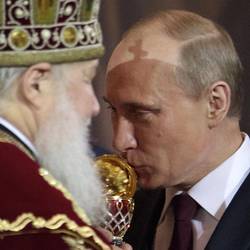Over at the XX Committee, John Schindler takes a look at what he calls “Putin’s Orthodox Jihad.” Trying to make sense of Putin’s ideology, much of which appears to have been adopted on the hoof as Russia’s leader attempted to fill the vacuum left first by Communism and then by the failure of Western-style democracy to “take” in Russia, is not a straightforward process (not least because Putin’s loyalties appear to be more to institutions than to ideas) but Schindler’s intriguing analysis makes an increasing amount of sense:
Putin is a complex character himself, with his worldview being profoundly shaped by his long service as a Soviet secret policeman; he exudes what Russians term Chekism – conspiracy-based thinking that sees plots abounding and is reflexively anti-Western, with heavy doses of machismo and KGB tough-talk . . .
This year ending also saw the mask drop regarding Putin’s ideology beyond his bone-deep Chekism. In his fire-breathing speech to the Duma in March when he announced Russia’s annexation of Crimea, Putin included not just venerable KGB classics like warnings about the Western Fifth Column and “national traitors,” but also paeans to explicit Russian ethnic nationalism buttressed by Orthodox mysticism, with citations of saints from millennia past. This was the culmination of years of increasingly unsubtle hints from Putin and his inner circle that what ideologically motivates this Kremlin is the KGB cult unified with Russian Orthodoxy. Behind the Chekist sword and shield lurks the Third Rome, forming a potent and, to many Russians, plausible worldview. That this take on the planet and its politics is intensely anti-Western needs to be stated clearly….
Whether this faith is genuine or a well-honed pose, Putin’s potent fusion of KGB values and Orthodoxy has been building for years, though few Westerners have noticed. Early in Putin’s years in the Kremlin, the younger generation of Federal Security Service (FSB) officers embraced a nascent ideology they termed “the system” (sistema), which was a sort of elitist Chekism — toughness free of corruption and based in patriotism — updated for the new 21st century. However, this could have limited appeal to the masses, so its place was gradually taken by a doctrine termed “spiritual security.”
…It suddenly became fashionable for senior FSB officers to have conversion experiences, while “spiritual security” offered Putin’s Russia a way to defend itself against what it has long seen as the encroachment of decadent post-modern Western values. Just how seriously Putin took all this was his statement that Russia’s “spiritual shield” was as important to her security as her nuclear shield.
Schindler adds:
Nearly all Western experts, being mostly secularists when not atheists, paid no attention to these clear indications of where Putin was taking Russia…
There’s quite a bit to that aside, and there is also something of a parallel with the failure of many in the West to take the rise of militant Islam as seriously as they should have done. People (particularly in Europe) simply could not conceive that a religion could matter so much “in this day and age,” a mistake that arose from the belief held by many secularists/atheists that religious faith was something that would eventually wither safely away, a conviction that owed much to smugness and not a little to denial. There has been an unwillingness to accept the (to them) inconvenient truth that the religious instinct seems to be something with which the vast majority of people are born.
And there is something else. To believe that religion would either wither away or fade into some sort of benevolent irrelevance took a quite remarkable ignorance of history. The modern academy has been delighted to oblige.
There’s a great deal more to Schindler’s piece that’s worth mulling (so read the whole thing), not least the connection that Putin has developed with some (and I would emphasize that “some”) on the European right and the way that virulent opposition to what is only one interpretation of America has provided him with the great enemy that regimes such as his always need.
Check out also Schindler’s focus on a recent speech by Archpriest Vsevolod Chaplin, a curious character he describes as a “media gadfly cleric.” Well Chaplin is certainly that, but as Schindler points out, he is also a very senior spokesman for the Russian Orthodox Church (FWIW I blogged about Chaplin at this secularist spot a few weeks back):
Chaplin minced no words, proclaiming that Russia’s God-given goal today is halting the global “American project.” As he explained:
“It is no coincidence that we have often, at the price of our own lives … stopped all global projects that disagreed with our conscience, with our vision of history and, I would say, with God’s own truth .. Such was Napoleon’s project, such was Hitler’s project. We will stop the American project too.”
We’ll see, but we should not fool ourselves that sanctions and Russia’s worsening economic plight will be enough to see off the challenge from Moscow any time soon. As Schindler observes:
[Putin’s] regime has created and nurtured a virulent ideology, an explosive amalgam of xenophobia, Chekism and militant Orthodoxy which justifies the Kremlin’s actions and explains why the West must be opposed at all costs. Given the economic crisis that Russia now finds itself in, thanks to Western sanctions, during the long and cold winter now starting, we ought to expect more, not fewer, Russians turning to this worldview which resonates with their nation’s history and explains the root of their suffering.
That is not a comforting thought.

